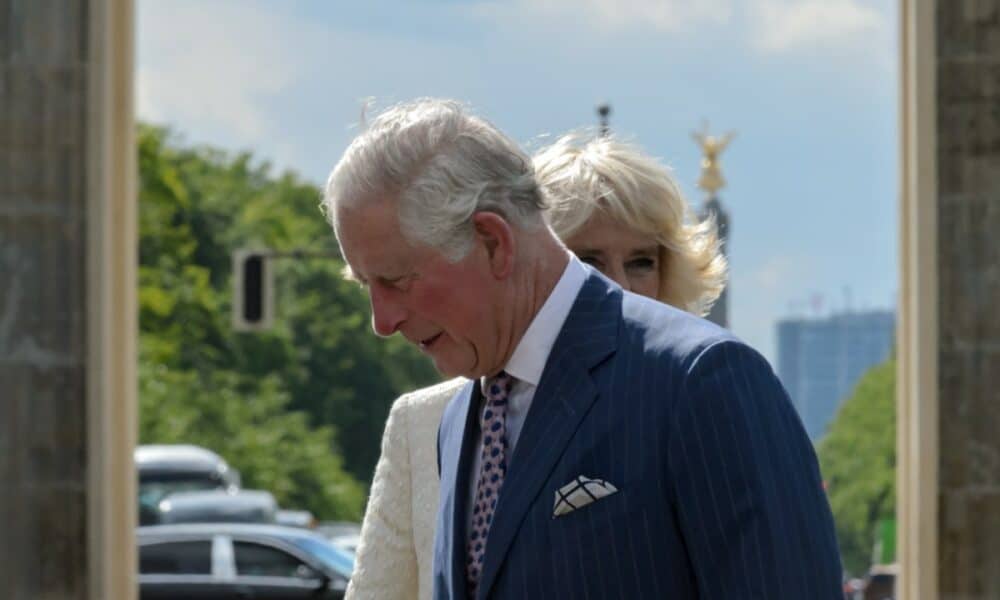The ongoing tensions within the British royal family have escalated with the revelation that Queen Camilla has reportedly decided to ban Meghan Markle from attending the future funeral of King Charles III. Sources close to Buckingham Palace claim this decision was made as the King’s health deteriorated due to his ongoing battle with cancer. The strained relationship between Meghan Markle, King Charles, and Queen Camilla has been well-documented for years, but this latest development highlights the deepening divide between the Sussexes and the rest of the royal family. Camilla’s decision is seen by many as an attempt to maintain a peaceful atmosphere during the monarch’s funeral, free from public confrontations, but it also underscores the unresolved tensions following Harry and Meghan’s departure from royal duties in 2020.
King Charles III’s cancer diagnosis, confirmed in February 2024, deeply concerned the British public. At 76, the monarch has been undergoing extensive treatment to fight the disease, but reports suggest the cancer has been aggressive and difficult to control. His declining health has sparked discussions about royal succession and the future of the British monarchy, especially amid the ongoing family tensions.
As King Charles navigates this challenging period, the family dynamic remains fraught with emotional distance and lingering resentments. Prince Harry, the King’s youngest son, has maintained limited contact with his family since moving to the United States, while Meghan Markle’s relationship with the royal family has worsened over time. Queen Camilla’s decision to exclude Meghan from the King’s funeral symbolizes the extent of the rift between the Sussexes and Buckingham Palace.
King Charles III’s health and its impact on the monarchy
King Charles III’s cancer diagnosis was a significant blow to both the royal family and the United Kingdom. In February 2024, Buckingham Palace officially announced that the King was undergoing cancer treatment, though specific details about the type and stage of the illness were withheld. Since then, Charles has undergone various treatments, including chemotherapy and immunotherapy, but insider reports indicate that the cancer has progressed rapidly, leading experts to describe the situation as “irreversible.”
The deterioration of the King’s health has brought discussions about the monarchy’s stability to the forefront. Since ascending the throne in September 2022, following Queen Elizabeth II’s death, King Charles has tried to balance maintaining royal traditions with modernizing aspects of the institution. However, his illness has fueled speculation about succession plans and the royal family’s preparedness for a potential transition.
Prince William, as Charles’ eldest son and direct heir, has been preparing for the possibility of assuming royal duties earlier than expected. Sources suggest that William has been involved in private meetings to better understand the responsibilities that come with the crown. Should King Charles pass away or choose to abdicate, William would ascend the throne as the next King of the United Kingdom, with his wife, Kate Middleton, becoming Queen Consort.
The growing rift between Harry, Meghan, and the royal family
The relationship between Prince Harry, Meghan Markle, and the royal family has been strained since the couple stepped back from royal duties in 2020. Their decision to leave and move to the United States marked the beginning of a turbulent period for the monarchy. This rift deepened following Harry and Meghan’s explosive interview with Oprah Winfrey in March 2021, during which they made serious allegations against the royal family, including accusations of racism and emotional neglect.
King Charles was reportedly deeply hurt by the couple’s public criticisms, particularly the claims that unidentified family members made racist comments about Harry and Meghan’s son, Archie. Queen Camilla also became a central figure in the family feud, especially after Prince Harry’s memoir, Spare, where he described a complicated dynamic with his stepmother.
Recent reports that Queen Camilla plans to exclude Meghan from the King’s funeral highlight the extent of the lingering resentment. Insiders suggest Camilla views Meghan’s potential presence as inappropriate, fearing it could spark further controversy during a solemn occasion. It’s believed that King Charles shares Camilla’s concerns, still harboring unresolved feelings about Meghan’s public criticism of the royal family.
Royal funeral protocol and Camilla’s role in planning
State funerals for British monarchs are deeply rooted in tradition and follow strict protocols. These ceremonies typically involve a series of formal events, including processions, memorial services, and public tributes. While the primary elements of the funeral are dictated by longstanding royal customs, the immediate family often has influence over specific details, including the guest list.
As Queen Consort, Camilla will play a significant role in planning King Charles III’s funeral. Her decision to exclude Meghan Markle is seen as an attempt to prevent potential disruptions during the ceremony and maintain the dignity of the proceedings. Reports indicate that this decision was made following discussions with King Charles, who reportedly agrees that Meghan’s presence could be problematic.
Although royal funerals are highly scripted, personal family issues often influence certain decisions, leading to internal tensions that sometimes spill into public view. Meghan Markle’s exclusion, as a high-profile figure, is expected to attract considerable attention and spark debates about how the royal family handles private grievances during public events.
Succession and the future of the British monarchy
The decline in King Charles III’s health has intensified discussions about royal succession and the long-term future of the monarchy. Prince William, as the next in line, has been preparing for the possibility of becoming King sooner than anticipated. Upon his ascension, Kate Middleton would become Queen Consort, while their eldest son, Prince George, would move to the top of the line of succession.
Many see this impending transition as an opportunity for the monarchy to modernize further. William and Kate have been popular figures, especially among younger generations, and there is hope that their leadership could bring a more progressive approach to royal duties and public engagement.
However, the ongoing estrangement between Prince Harry, Meghan Markle, and the royal family complicates the monarchy’s image. Despite being fifth in line to the throne, Harry’s self-imposed exile and public criticisms have created a rift that seems increasingly difficult to mend. Meghan’s exclusion from King Charles’ funeral may further solidify this divide, raising questions about whether reconciliation is even possible.
Public reaction to Camilla’s decision
Queen Camilla’s decision to ban Meghan Markle from attending the funeral has sparked mixed reactions among the British public. Some support the move, viewing it as necessary to preserve the sanctity of the event, free from the controversies that have plagued the royal family in recent years. Others see the decision as unnecessarily harsh, arguing that moments of mourning should be opportunities for healing rather than deepening family divisions.
Public opinion polls show that Camilla’s popularity has improved since becoming Queen Consort, but her past controversies, particularly involving Princess Diana, still affect how she is perceived. Her role in excluding Meghan from the funeral may be seen as an act of loyalty to the monarchy or as an example of ongoing hostility toward the Sussexes, depending on the perspective.
Among Harry and Meghan’s supporters, Camilla’s decision has been widely criticized. Many argue that banning Meghan only reinforces the perception that the royal family remains intolerant and unwilling to bridge divides. In contrast, traditional monarchists believe that the monarchy should prioritize unity and decorum during significant events, even if that means making controversial decisions.
Royal funeral traditions and ceremonial elements
British royal funerals are steeped in centuries-old traditions that dictate every aspect of the event. The funeral of Queen Elizabeth II in 2022 followed a meticulous protocol, drawing leaders and dignitaries from around the world.
Typical elements of royal state funerals include:
- Formal procession: The monarch’s coffin is transported on a ceremonial carriage, accompanied by royal guards and family members.
- Religious ceremony: The funeral service is usually held at Westminster Abbey or St. George’s Chapel, followed by eulogies and prayers.
- Public tributes: Citizens are given the opportunity to pay their respects, often through public viewings and moments of national silence.
- International participation: Heads of state and royal family members from other nations typically attend to honor the deceased monarch.
For King Charles III’s funeral, the “Operation Menai Bridge” plan outlines these traditional elements, but the family retains some flexibility to personalize aspects of the ceremony. Meghan Markle’s deliberate exclusion highlights how personal conflicts can influence even the most formal and public royal events.
Global reactions and international perspective
The British royal family’s decisions often attract global attention, and the exclusion of Meghan Markle from King Charles III’s funeral has been widely covered in international media. In the United States, where Harry and Meghan now reside, many outlets criticized Camilla’s decision, emphasizing the emotional impact it may have on the couple. Conversely, British media presented a more balanced perspective, acknowledging both the support and criticism surrounding the move.
In other monarchies, such as Spain and the Netherlands, royal experts discussed the delicate balance royal families must maintain between tradition and personal dynamics. Camilla’s decision was viewed as an example of how internal family disputes can influence even the most solemn royal occasions.
Conclusion of the case analysis
Queen Camilla’s decision to ban Meghan Markle from King Charles III’s funeral marks a significant moment in the ongoing tensions within the British royal family. While the palace aims to maintain decorum during this delicate time, Meghan’s exclusion highlights the unresolved rifts between the Sussexes and the rest of the royal family. This complex situation underscores the challenges the monarchy faces in balancing tradition, modernity, and evolving family dynamics.

The ongoing tensions within the British royal family have escalated with the revelation that Queen Camilla has reportedly decided to ban Meghan Markle from attending the future funeral of King Charles III. Sources close to Buckingham Palace claim this decision was made as the King’s health deteriorated due to his ongoing battle with cancer. The strained relationship between Meghan Markle, King Charles, and Queen Camilla has been well-documented for years, but this latest development highlights the deepening divide between the Sussexes and the rest of the royal family. Camilla’s decision is seen by many as an attempt to maintain a peaceful atmosphere during the monarch’s funeral, free from public confrontations, but it also underscores the unresolved tensions following Harry and Meghan’s departure from royal duties in 2020.
King Charles III’s cancer diagnosis, confirmed in February 2024, deeply concerned the British public. At 76, the monarch has been undergoing extensive treatment to fight the disease, but reports suggest the cancer has been aggressive and difficult to control. His declining health has sparked discussions about royal succession and the future of the British monarchy, especially amid the ongoing family tensions.
As King Charles navigates this challenging period, the family dynamic remains fraught with emotional distance and lingering resentments. Prince Harry, the King’s youngest son, has maintained limited contact with his family since moving to the United States, while Meghan Markle’s relationship with the royal family has worsened over time. Queen Camilla’s decision to exclude Meghan from the King’s funeral symbolizes the extent of the rift between the Sussexes and Buckingham Palace.
King Charles III’s health and its impact on the monarchy
King Charles III’s cancer diagnosis was a significant blow to both the royal family and the United Kingdom. In February 2024, Buckingham Palace officially announced that the King was undergoing cancer treatment, though specific details about the type and stage of the illness were withheld. Since then, Charles has undergone various treatments, including chemotherapy and immunotherapy, but insider reports indicate that the cancer has progressed rapidly, leading experts to describe the situation as “irreversible.”
The deterioration of the King’s health has brought discussions about the monarchy’s stability to the forefront. Since ascending the throne in September 2022, following Queen Elizabeth II’s death, King Charles has tried to balance maintaining royal traditions with modernizing aspects of the institution. However, his illness has fueled speculation about succession plans and the royal family’s preparedness for a potential transition.
Prince William, as Charles’ eldest son and direct heir, has been preparing for the possibility of assuming royal duties earlier than expected. Sources suggest that William has been involved in private meetings to better understand the responsibilities that come with the crown. Should King Charles pass away or choose to abdicate, William would ascend the throne as the next King of the United Kingdom, with his wife, Kate Middleton, becoming Queen Consort.
The growing rift between Harry, Meghan, and the royal family
The relationship between Prince Harry, Meghan Markle, and the royal family has been strained since the couple stepped back from royal duties in 2020. Their decision to leave and move to the United States marked the beginning of a turbulent period for the monarchy. This rift deepened following Harry and Meghan’s explosive interview with Oprah Winfrey in March 2021, during which they made serious allegations against the royal family, including accusations of racism and emotional neglect.
King Charles was reportedly deeply hurt by the couple’s public criticisms, particularly the claims that unidentified family members made racist comments about Harry and Meghan’s son, Archie. Queen Camilla also became a central figure in the family feud, especially after Prince Harry’s memoir, Spare, where he described a complicated dynamic with his stepmother.
Recent reports that Queen Camilla plans to exclude Meghan from the King’s funeral highlight the extent of the lingering resentment. Insiders suggest Camilla views Meghan’s potential presence as inappropriate, fearing it could spark further controversy during a solemn occasion. It’s believed that King Charles shares Camilla’s concerns, still harboring unresolved feelings about Meghan’s public criticism of the royal family.
Royal funeral protocol and Camilla’s role in planning
State funerals for British monarchs are deeply rooted in tradition and follow strict protocols. These ceremonies typically involve a series of formal events, including processions, memorial services, and public tributes. While the primary elements of the funeral are dictated by longstanding royal customs, the immediate family often has influence over specific details, including the guest list.
As Queen Consort, Camilla will play a significant role in planning King Charles III’s funeral. Her decision to exclude Meghan Markle is seen as an attempt to prevent potential disruptions during the ceremony and maintain the dignity of the proceedings. Reports indicate that this decision was made following discussions with King Charles, who reportedly agrees that Meghan’s presence could be problematic.
Although royal funerals are highly scripted, personal family issues often influence certain decisions, leading to internal tensions that sometimes spill into public view. Meghan Markle’s exclusion, as a high-profile figure, is expected to attract considerable attention and spark debates about how the royal family handles private grievances during public events.
Succession and the future of the British monarchy
The decline in King Charles III’s health has intensified discussions about royal succession and the long-term future of the monarchy. Prince William, as the next in line, has been preparing for the possibility of becoming King sooner than anticipated. Upon his ascension, Kate Middleton would become Queen Consort, while their eldest son, Prince George, would move to the top of the line of succession.
Many see this impending transition as an opportunity for the monarchy to modernize further. William and Kate have been popular figures, especially among younger generations, and there is hope that their leadership could bring a more progressive approach to royal duties and public engagement.
However, the ongoing estrangement between Prince Harry, Meghan Markle, and the royal family complicates the monarchy’s image. Despite being fifth in line to the throne, Harry’s self-imposed exile and public criticisms have created a rift that seems increasingly difficult to mend. Meghan’s exclusion from King Charles’ funeral may further solidify this divide, raising questions about whether reconciliation is even possible.
Public reaction to Camilla’s decision
Queen Camilla’s decision to ban Meghan Markle from attending the funeral has sparked mixed reactions among the British public. Some support the move, viewing it as necessary to preserve the sanctity of the event, free from the controversies that have plagued the royal family in recent years. Others see the decision as unnecessarily harsh, arguing that moments of mourning should be opportunities for healing rather than deepening family divisions.
Public opinion polls show that Camilla’s popularity has improved since becoming Queen Consort, but her past controversies, particularly involving Princess Diana, still affect how she is perceived. Her role in excluding Meghan from the funeral may be seen as an act of loyalty to the monarchy or as an example of ongoing hostility toward the Sussexes, depending on the perspective.
Among Harry and Meghan’s supporters, Camilla’s decision has been widely criticized. Many argue that banning Meghan only reinforces the perception that the royal family remains intolerant and unwilling to bridge divides. In contrast, traditional monarchists believe that the monarchy should prioritize unity and decorum during significant events, even if that means making controversial decisions.
Royal funeral traditions and ceremonial elements
British royal funerals are steeped in centuries-old traditions that dictate every aspect of the event. The funeral of Queen Elizabeth II in 2022 followed a meticulous protocol, drawing leaders and dignitaries from around the world.
Typical elements of royal state funerals include:
- Formal procession: The monarch’s coffin is transported on a ceremonial carriage, accompanied by royal guards and family members.
- Religious ceremony: The funeral service is usually held at Westminster Abbey or St. George’s Chapel, followed by eulogies and prayers.
- Public tributes: Citizens are given the opportunity to pay their respects, often through public viewings and moments of national silence.
- International participation: Heads of state and royal family members from other nations typically attend to honor the deceased monarch.
For King Charles III’s funeral, the “Operation Menai Bridge” plan outlines these traditional elements, but the family retains some flexibility to personalize aspects of the ceremony. Meghan Markle’s deliberate exclusion highlights how personal conflicts can influence even the most formal and public royal events.
Global reactions and international perspective
The British royal family’s decisions often attract global attention, and the exclusion of Meghan Markle from King Charles III’s funeral has been widely covered in international media. In the United States, where Harry and Meghan now reside, many outlets criticized Camilla’s decision, emphasizing the emotional impact it may have on the couple. Conversely, British media presented a more balanced perspective, acknowledging both the support and criticism surrounding the move.
In other monarchies, such as Spain and the Netherlands, royal experts discussed the delicate balance royal families must maintain between tradition and personal dynamics. Camilla’s decision was viewed as an example of how internal family disputes can influence even the most solemn royal occasions.
Conclusion of the case analysis
Queen Camilla’s decision to ban Meghan Markle from King Charles III’s funeral marks a significant moment in the ongoing tensions within the British royal family. While the palace aims to maintain decorum during this delicate time, Meghan’s exclusion highlights the unresolved rifts between the Sussexes and the rest of the royal family. This complex situation underscores the challenges the monarchy faces in balancing tradition, modernity, and evolving family dynamics.







